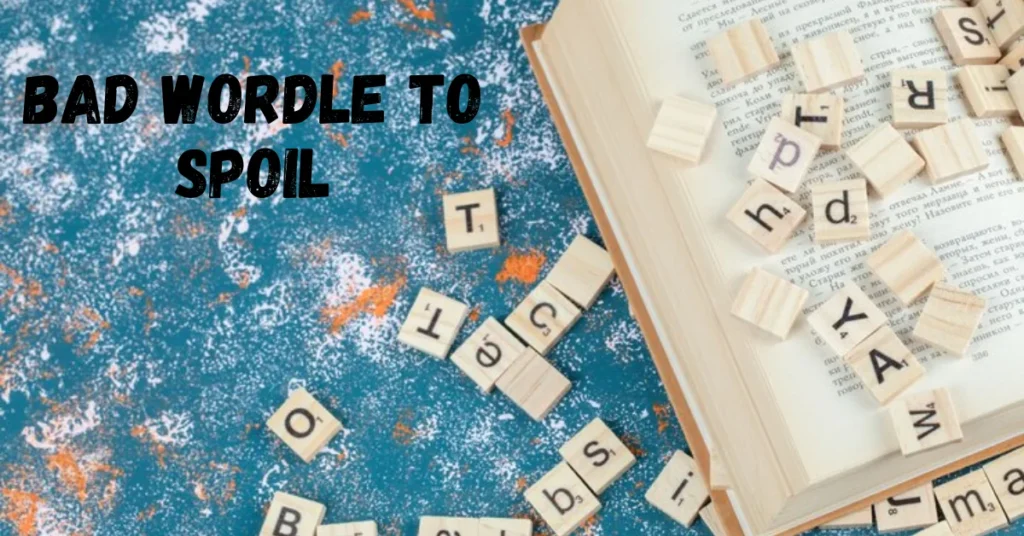Introduction to crossword puzzles and word games
Crossword puzzles and word games have captivated minds for centuries, offering a delightful blend of challenge and entertainment. With their clever clues and satisfying solutions, they provide the perfect mental workout. Recently, one game has emerged to dominate conversations: bad wordle to spoil. This addictive daily puzzle has taken the internet by storm, drawing players into its simple yet captivating gameplay.
But alongside its rising popularity comes an unfortunate side effect—problematic words that can spoil the fun for many players. As we explore this intriguing intersection of language and gaming, it’s essential to address how these issues affect our enjoyment of word games while considering ways to keep them inclusive and respectful. Let’s dive deeper into what makes Wordle so engaging and why certain words might pose a problem in this beloved pastime.
The popularity of Wordle and its addictive nature
Wordle has taken the world by storm. Every day, millions of players eagerly await their daily puzzle fix. The game’s simple mechanics draw users in with ease.
Its addictive nature lies in its blend of challenge and accessibility. Players only have six tries to guess a five-letter word, creating an exhilarating pressure that keeps them returning for more.
The social aspect amplifies this experience; sharing results on social media fuels competition among friends and family.
Every successful guess brings a rush of satisfaction, while failures ignite curiosity about the elusive solution. This balance makes each day feel like a fresh adventure filled with possibilities.
Even those new to word games find themselves captivated, often playing multiple times just to improve their skills or beat personal records. Wordle taps into our desire for achievement while fostering community connections through shared challenges.
Problematic words found in Wordle
Wordle has taken the world by storm, captivating players with its daily challenges. However, not all words used in this game are created equal.
Some terms can raise eyebrows and spark debates among fans. Certain entries might be deemed offensive or inappropriate for a family-friendly environment. These problematic words can detract from the enjoyment of the game, particularly when shared among friends and loved ones.
The surprise element that makes Wordle exciting also leaves room for discomfort when unexpected terms pop up. Players often find themselves navigating sensitive topics unintentionally.
Consequently, discussions about what constitutes an acceptable word have gained traction within the community. The balance between challenging vocabulary and respect for diverse audiences remains a hot topic amongst avid players seeking to enjoy their daily puzzle without crossing lines.
Discussion on the controversy surrounding
The rise of Wordle has not been without its challenges. While many enjoy the daily brain teaser, some players have voiced concerns about certain words included in the game.
A few choices have sparked outrage and debates within the community. Words that are deemed offensive or inappropriate can tarnish what is meant to be a fun experience for all ages.
Players expect a level of sensitivity when it comes to language, especially given the diverse audience engaging with word games today. The inclusion of these so-called “bad Wordle” terms raises questions about who curates content and their responsibility towards inclusivity.
Discussions often highlight how games should evolve alongside cultural sensitivities. As players demand better representation in gaming, developers must listen closely to feedback and adjust accordingly. This ongoing dialogue reflects broader societal changes regarding language use and respectfulness in entertainment forms.
Ways to avoid offensive words in your Wordle game
One effective way to steer clear of offensive words in Wordle is by setting personal guidelines. Decide upfront which types of language you want to avoid. This can help keep your game enjoyable and inclusive.
Another tip is to play with a diverse group of friends or family members. They can provide feedback on word choices, making the experience more collaborative and respectful.
Additionally, consider using online resources that discuss appropriate vocabulary for word games. These lists often highlight commonly accepted terms while steering away from potentially harmful ones.
Engage with the community through forums or social media groups dedicated to Wordle enthusiasts. Many players share their experiences and suggest alternatives when inappropriate words arise.
Alternative word games that are more family-friendly
If you’re searching for family-friendly alternatives to Wordle, consider trying Boggle. This classic game challenges players to find as many words as possible from a grid of letters within a time limit. It’s fast-paced and encourages teamwork.
Another great option is Scrabble. Gather your loved ones around the board and create words using letter tiles. It’s educational and helps improve vocabulary skills while being enjoyable for all ages.
For something more digital, try Quordle or Octordle. These games are similar to Wordle but allow multiple guesses at once, making it even more thrilling without crossing any lines.
If you’re looking for cooperative gameplay, check out Letterpress. Players work together to capture letters on a grid by forming words, fostering camaraderie instead of competition.
These options ensure everyone can enjoy wordplay without encountering problematic content or offensive language that might spoil the fun.
Conclusion: Enjoying word games responsibly and respecting others’ sensitivities
Enjoying word games responsibly is essential in today’s diverse world. As we engage with popular titles like Wordle, it’s crucial to be mindful of the language we encounter and use. This means being aware that certain words can affect players differently based on their backgrounds and experiences.
Respecting others’ sensitivities should always come first. Players can choose to play games that promote inclusivity and positivity rather than those filled with problematic words.
By focusing on family-friendly alternatives, everyone can enjoy the thrill of wordplay without discomfort or controversy. Whether you stick with classics or explore new options, remember that the joy of gaming lies in shared experiences and understanding each other better through our choices.
FAQs
What is “bad Wordle to spoil”?
A “bad Wordle to spoil” refers to a word used in the Wordle game that could be considered offensive, inappropriate, or uncomfortable for certain players. These words can detract from the fun and inclusive experience that many players seek.
Why are some words considered problematic in Wordle?
Certain words in bad wordle to spoil may be seen as offensive or inappropriate for diverse audiences. This can create discomfort or unease, especially in family-friendly settings where the game is meant to be fun and lighthearted.
How can I avoid offensive words in Wordle?
To avoid problematic words, consider setting personal guidelines, playing with a diverse group, or using online resources that highlight acceptable vocabulary. Engaging with the bad wordle to spoil community can also help in staying informed about sensitive words.
Are there family-friendly alternatives to Wordle?
Yes! Games like Boggle, Scrabble, Quordle, and Letterpress offer similar wordplay fun without the risk of encountering problematic language. These games are great for players of all ages and can provide a more inclusive gaming experience.
Why is it important to be mindful of language in word games?
Being mindful of language in word games ensures an enjoyable and inclusive experience for all players, respecting their backgrounds and sensitivities. It’s about creating a positive and welcoming environment for everyone involved.







